Text

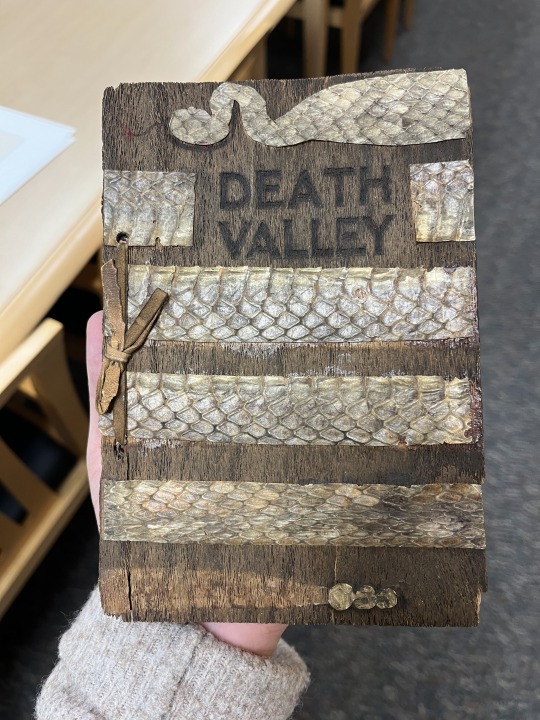
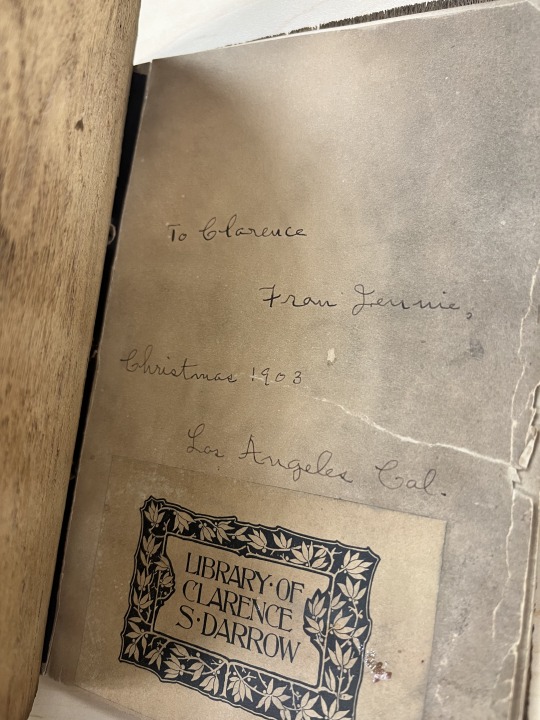

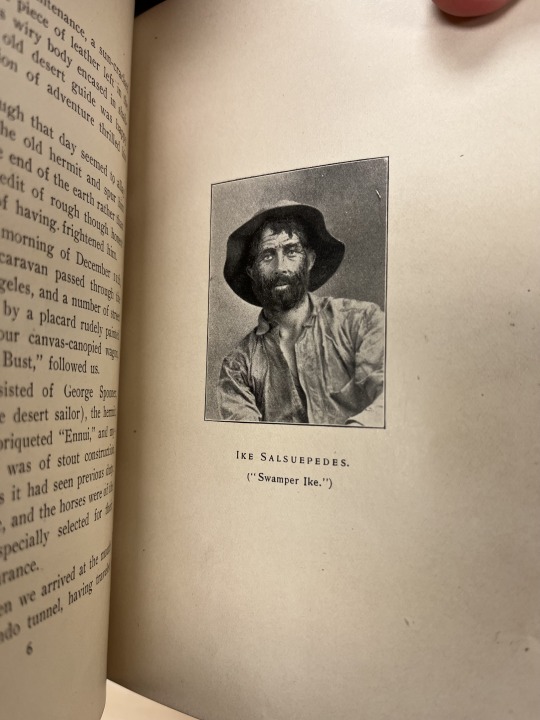
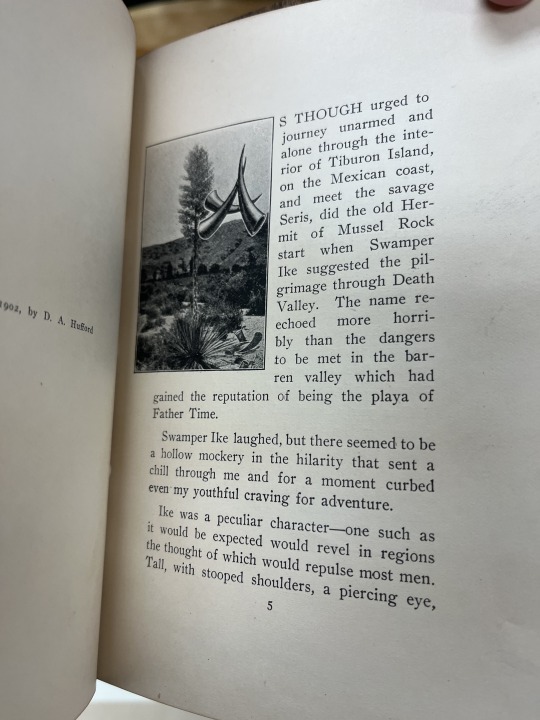
All I want for Christmas is a snakeskin book?
This copy of Death Valley: Swamper Ike's Traditional Lore: Why, When, How? was a Christmas gift to the famous American lawyer, Clarence Darrow, given to him by his sister Jennie in 1903.
We definitely think this is one of the most unique bindings in our collection. The thin wood boards feature strips of snakeskin in a coiled pattern (with a drawn-in tongue!) and the title is branded onto the cover, probably with hot iron.
The book describes an excursion from Los Angeles to Death Valley in 1901.
"Ike was a peculiar character--one such as it would be expected would revel in regions the thought of which would repulse most men."
#riesenfeld center#umn#university of minnesota law#university of minnesota law library#rare books#umn law#archives#special collections#law school#old books#clarence darrow#snake#snakeskin#western#book binding#death valley#christmas gift
31 notes
·
View notes
Text
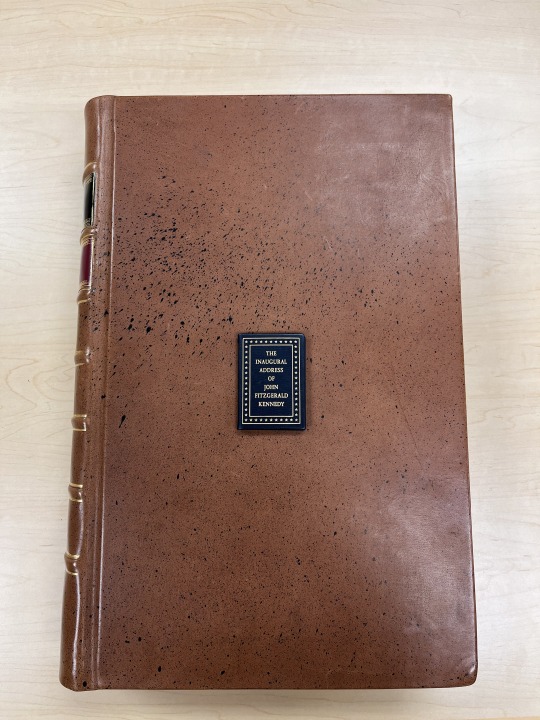


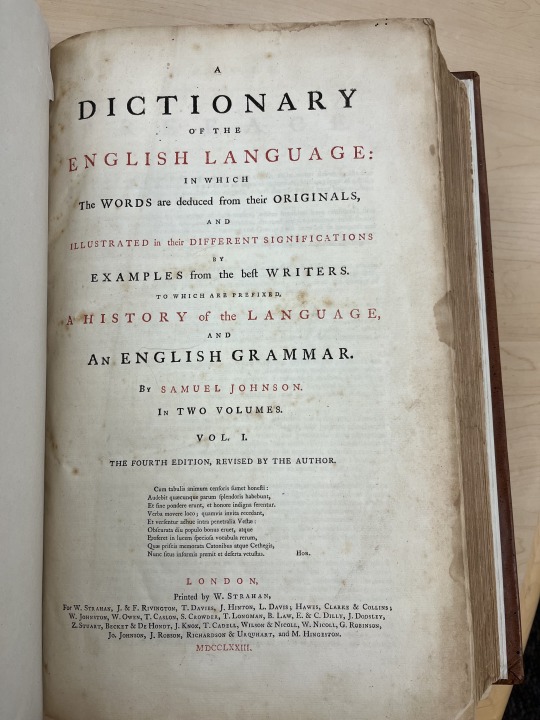

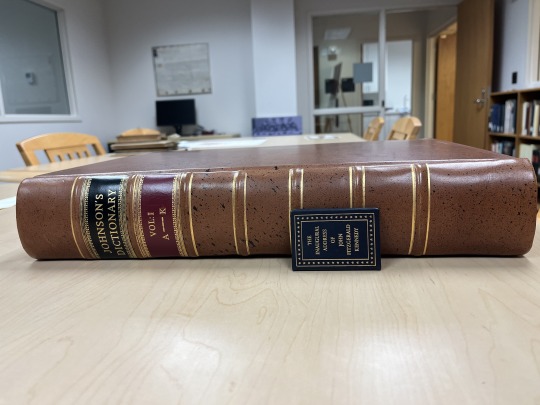
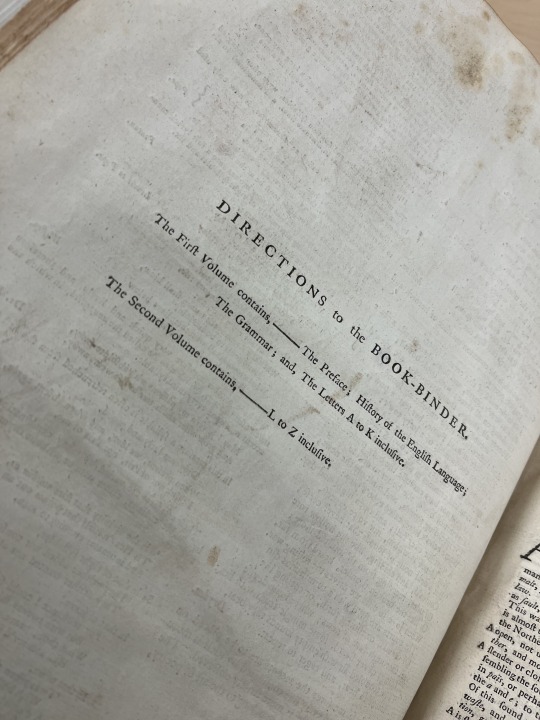
Happy Solar Eclipse day! 🌑🌒🌞
Here is our copy of the 4th edition, volume 1, of Samuel Johnson's A Dictionary of the English Language (1773) and Johnson's definitions of "eclipse" and "ecliptick." This is one of our larger books, which is especially evident next to our smallest book (The Inaugural Address of John Fitzgerald Kennedy).
ECLI'PSE. n.
1. An obscuration of the luminaries of heaven; the sun is eclipsed by the intervention of the moon; the moon by the interposition of the earth. The word originally signifies departure from a place, to which Milton alludes.
2. Darkness; obscuration.
To ECLI'PSE v. a. [from the noun]
To darken a luminary.
To extinguish; to put out.
To cloud; to obscure.
To disgrace.
You might spot some words you don't know within eclipse's surrounding entries. A new one to me was "eclegma," "A form of medicine made by the incorporation of oils with syrups, and which is to be taken upon a liquorice stick."
#riesenfeld center#umn#university of minnesota law#university of minnesota law library#rare books#umn law#archives#special collections#law school#old books#dictionary#reference books#eclipse#solar eclipse#big books
34 notes
·
View notes
Text
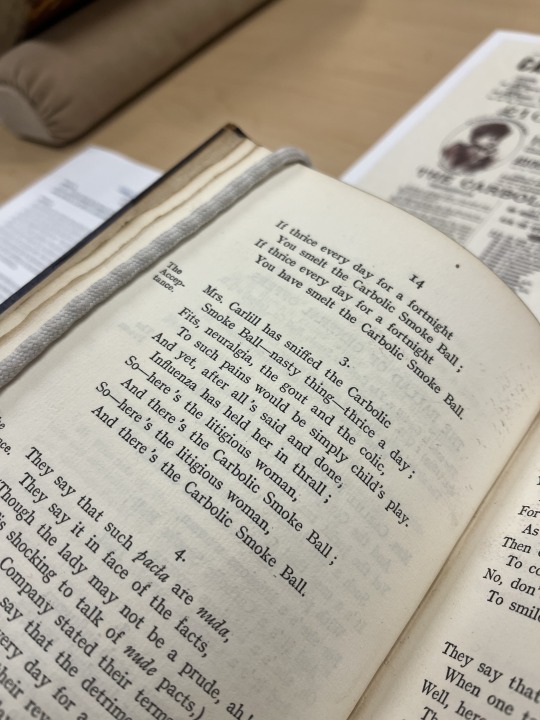
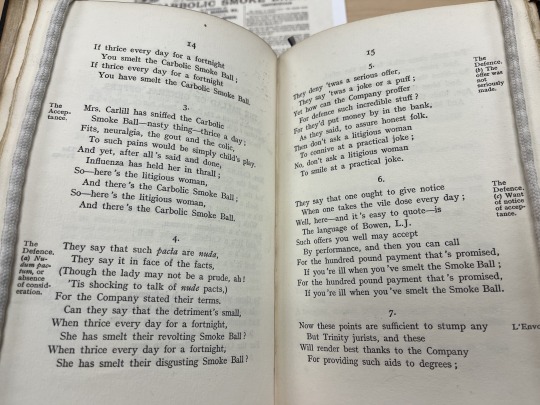

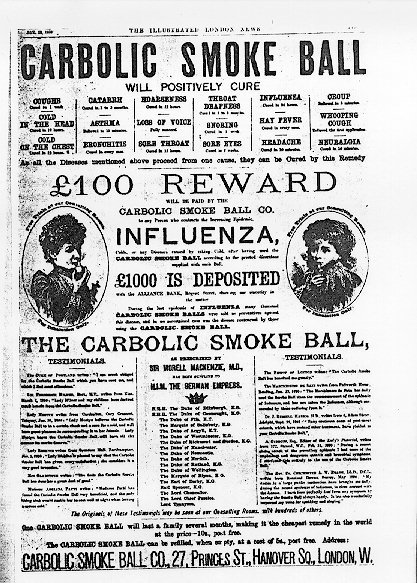
At our last monthly open house of the semester, we pulled a few items with poetry for National Poetry Month. In our copy of Ballads En Termes de la Ley, we stumbled upon a poem about the 1892 Carlill v. Carbolic Smoke Ball Company case, which many students recognized from their 1L contracts class.
A notable case in terms of contracts within advertisements, Carlill v. Carbolic involved the company's advertisement stating that buyers who found the product didn't work after using it as instructed could claim £100 (the equivalent of $20,186 USD today). When Louisa Carlill contracted influenza after using the smoke ball three times daily for nearly two months, she went to claim her reward. Carbolic claimed it wasn't a serious contract, but the court held that there was a fully binding contract.
"Mrs. Carlill has sniffed the Carbolic
Smoke Ball--nasty thing--thrice a day;
Fits of neuralgia, the gout and the colic,
To such pains would be simply child's play.
And yet, after all's said and done,
Influenza has held her in thrall"
#riesenfeld center#umn#university of minnesota law#university of minnesota law library#rare books#umn law#archives#special collections#law school#carbolic smoke ball#advertisement#old advertisements#poetry#national poetry month
17 notes
·
View notes
Text

An all-woman courtroom!
We recently framed this wonderful watercolor done by Twin Cities courtroom sketch artist, Nancy Muellner. This piece was commissioned for our 2019 exhibit, Women in the Law and felt perfect to share this month.
#riesenfeld center#umn#university of minnesota law#university of minnesota law library#umn law#special collections#law school#archives#courtroom#lawyer#women's history month#women#watercolor#sketch#women in law
27 notes
·
View notes
Text
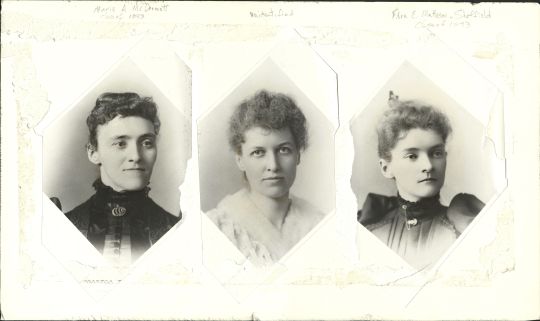
Happy Women's History Month! To kick off March, here is a photo from our archives of the first three women to graduate from the University of Minnesota Law School in 1893. Flora, pictured on the right, was the first woman to begin classes at the law school in 1890.
Left to right: Marie A. McDermott, Nora L. Morton, Flora E. Matteson
#riesenfeld center#umn#university of minnesota law#university of minnesota law library#umn law#archives#special collections#law school#old photos#vintage photography#portraits#women's history month#women's history#women lawyers#women in law
77 notes
·
View notes
Text
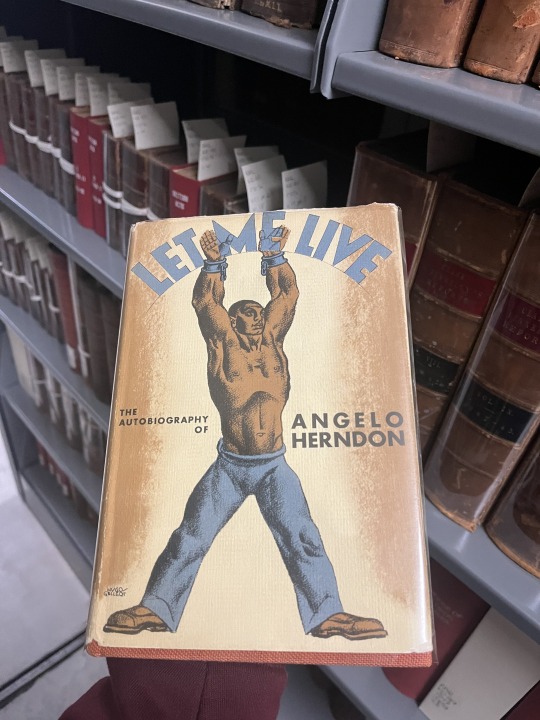
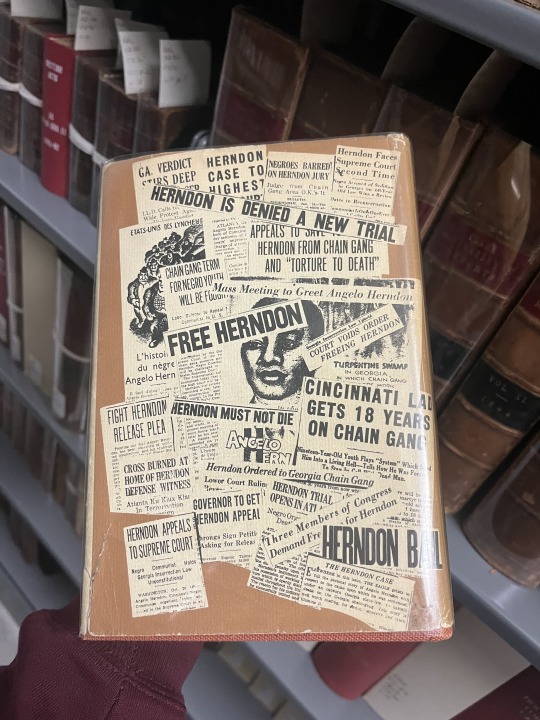
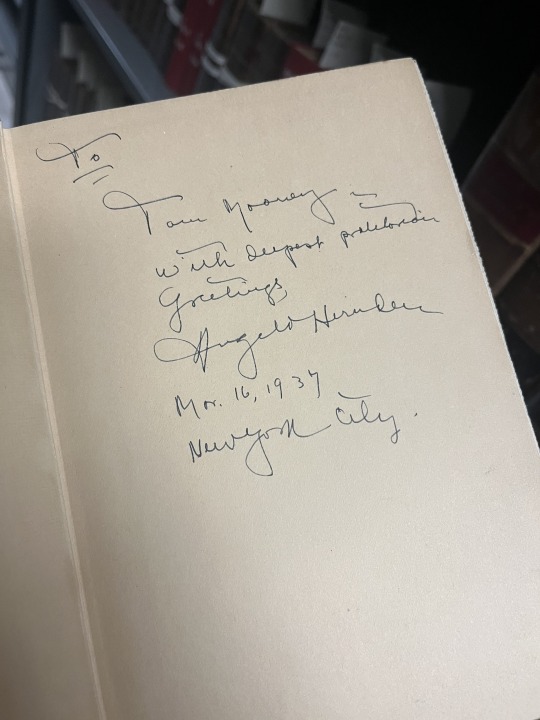
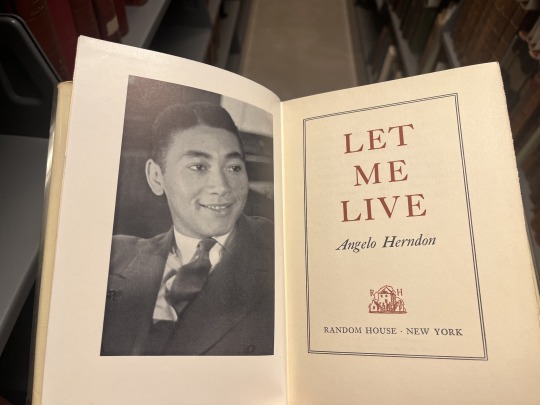
In honor of Black History Month, we'd like to share our copy of Let Me Live (1937), by Angelo Herndon.
Angelo Herndon (1913-1997) was a coal miner and labor organizer who worked across racial lines. After an attempt to organize black and white industrial workers in Atlanta in 1932, Herndon was arrested and convicted of insurrection. The prosecution case pointed to his possession of communist literature (all of which could be found at a public library), which were found in his hotel room.
Herndon was eventually sentenced to 18 to 20 years of hard labor, but his conviction was overturned by the state appeals court and he was released on bail. On April 26th, 1937, a narrow majority of the Supreme Court ruled in his favor, ruling Georgia's insurrection statute as unconstitutional.
Let Me Live, Herndon's autobiography written during his time in prison, tells the story of his arrest and times in court but also describes his early life up until that point.
This first edition copy features an inscription from Herndon to Thomas Mooney, a noted political activist and labor leader who was controversially imprisoned. When Herndon was out on bail awaiting appeals, he visited Mooney in prison and conducted an interview, which was published in Labor Defender in January, 1935.
To view more about this book and other materials to celebrate Black History Month, visit our digital exhibit, Law and the Struggle for Racial Justice.
#riesenfeld center#umn#university of minnesota law#university of minnesota law library#rare books#umn law#archives#special collections#law school#angelo herndon#black history month#black history matters#activism#black rights
109 notes
·
View notes
Text
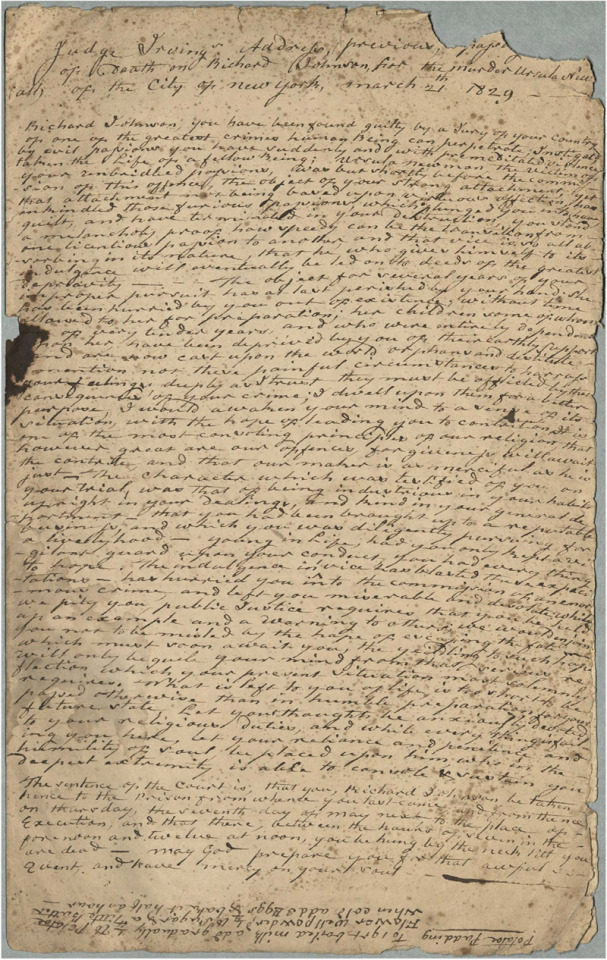
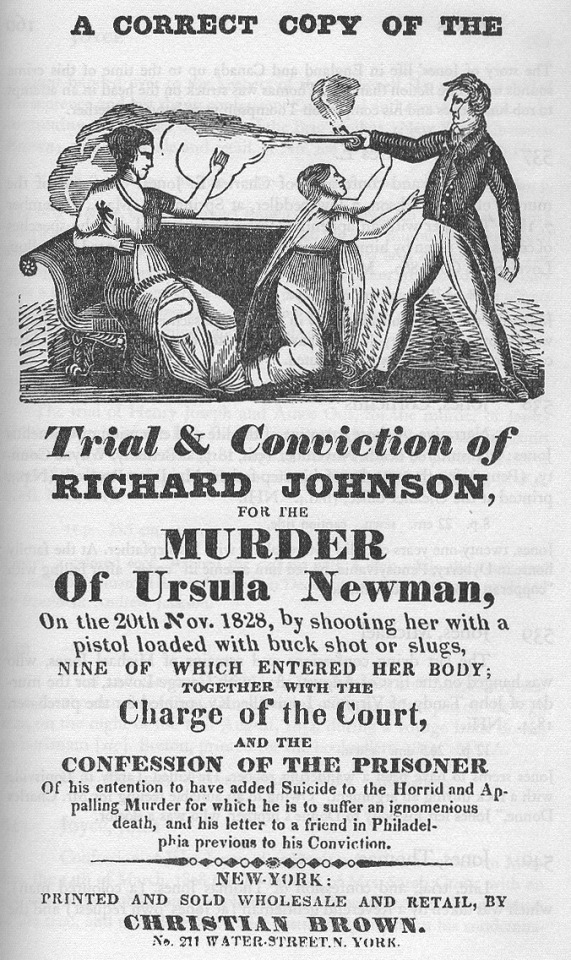

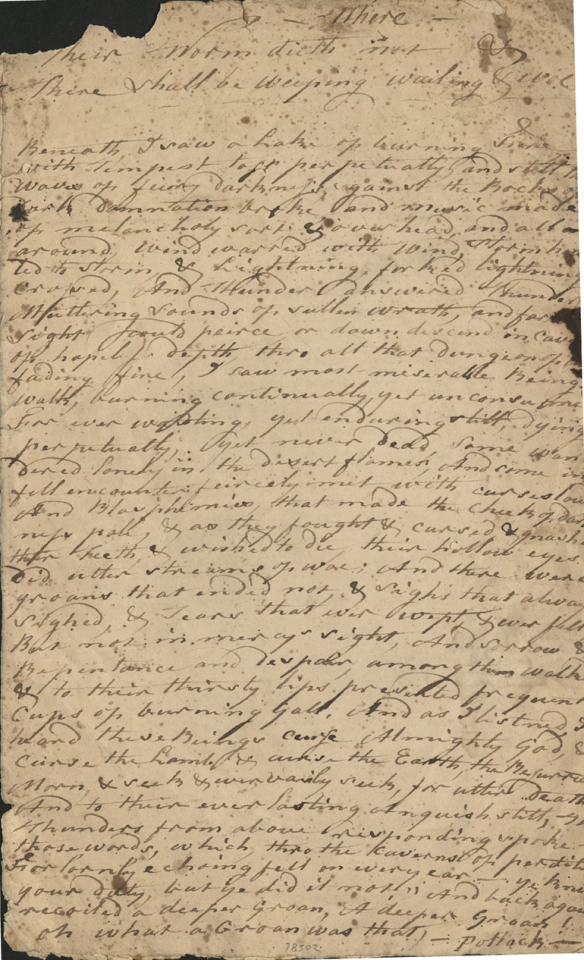
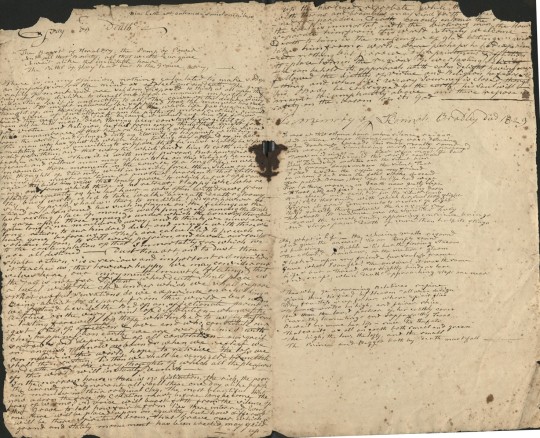
One of the items featured at our open house this week was this manuscript with a copy of the death sentence from an 1828 murder case. Richard Johnson was one of the last two people publicly executed in New York, alongside Catherine Cashiere, on May 9th, 1829.
This manuscript includes a couple extracts: a stanza from Gray's "Elegy Written in a Country Churchyard," paraphrases of Mark 9:48 and Revelation 18:19, and part of Book I of Robert Pollok's The Course of Time, which summarizes the damnation sections of the Book of Revelation.
Probably our favorite part, however, is a recipe for "Potatoe Pudding," scrawled upside down at the bottom of the first page.
The pamphlet image included was found here.
#riesenfeld center#umn#university of minnesota law#university of minnesota law library#rare books#umn law#archives#special collections#law school#manuscript#handwriting#murder trial#execution#recipe
41 notes
·
View notes
Text

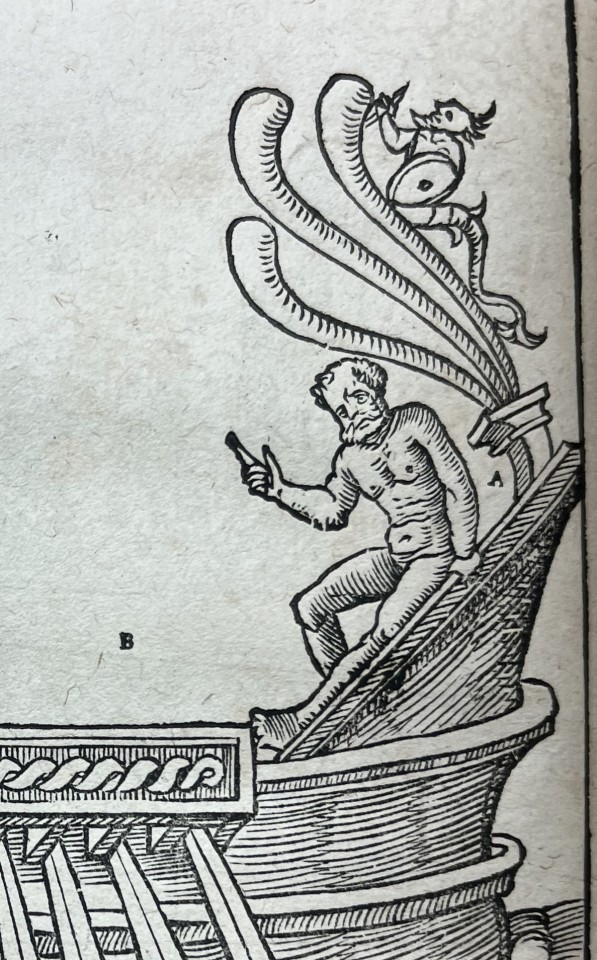

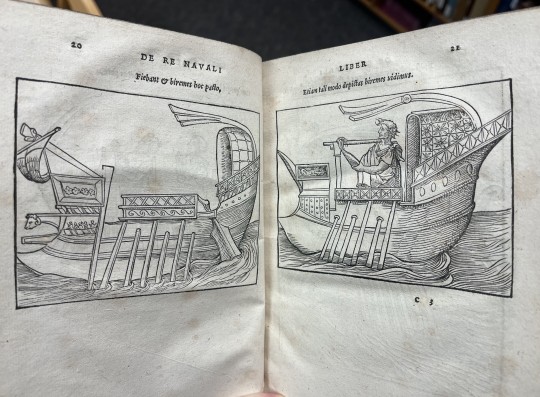

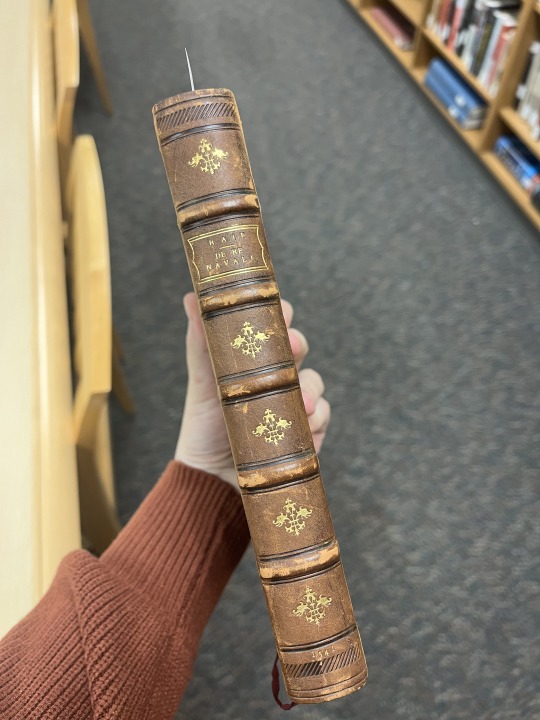
Some woodcuts for you from our 1541 Lazare de Baïf text, Annotationes in legem II De captiuis & postliminio reuersis. While he discusses the rights of captured soldiers and their later return to freedom, he gets a bit distracted by a reference to ships and explores Greek and Roman naval ships for most of the book.
#riesenfeld center#umn#university of minnesota law library#university of minnesota law#rare books#umn law#special collections#old books#law school#greek#roman#naval art#ships#1500s#16th century#woodcut illustrations#woodcut#woodcutwednesday
78 notes
·
View notes
Text
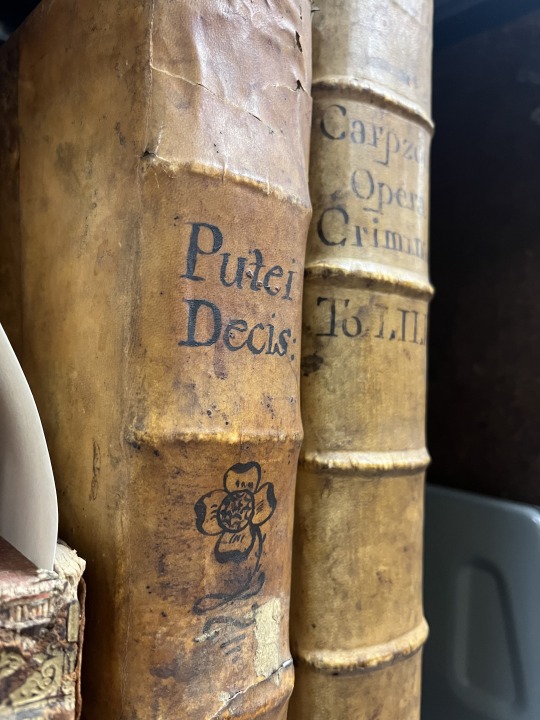
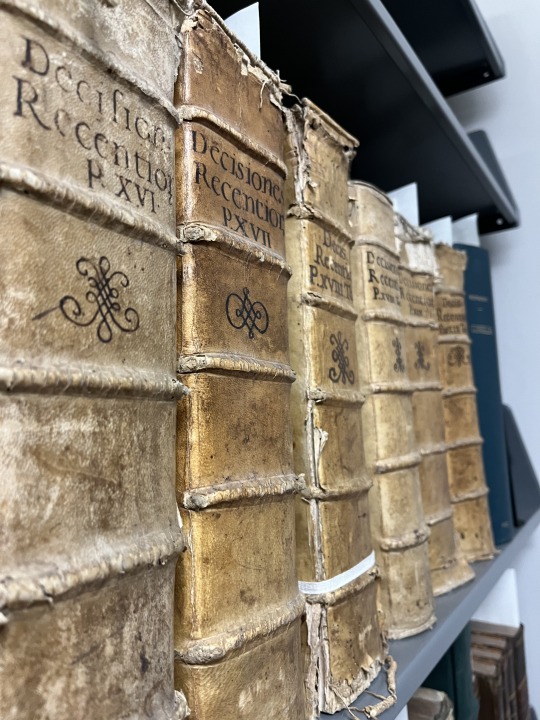
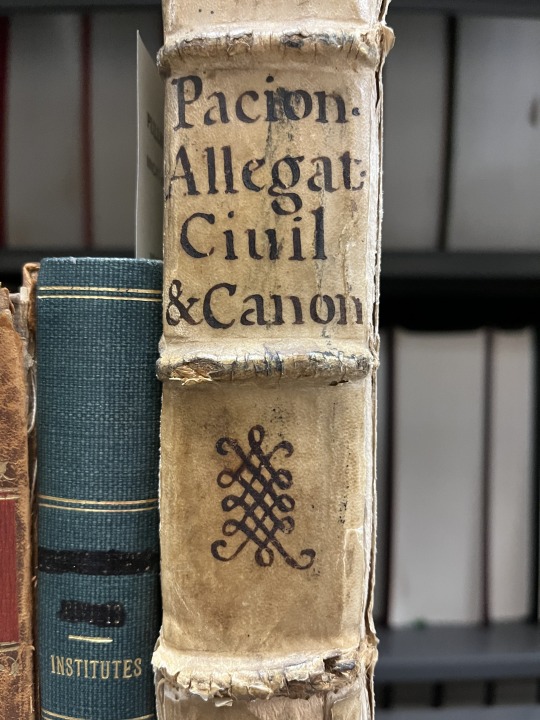

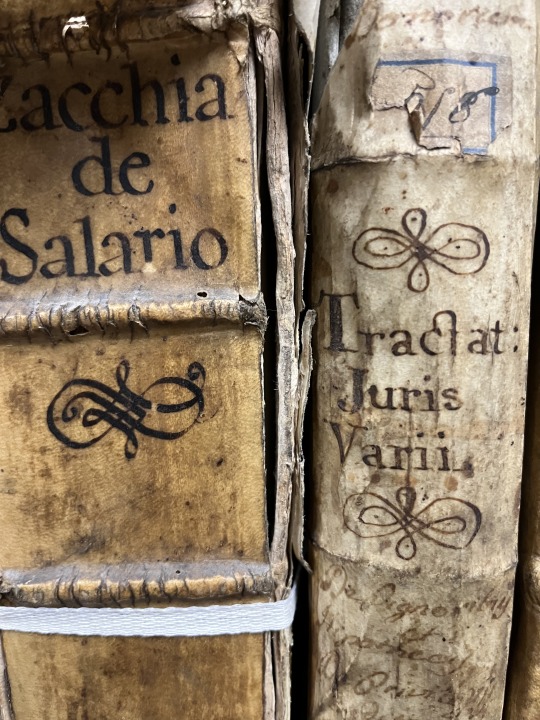
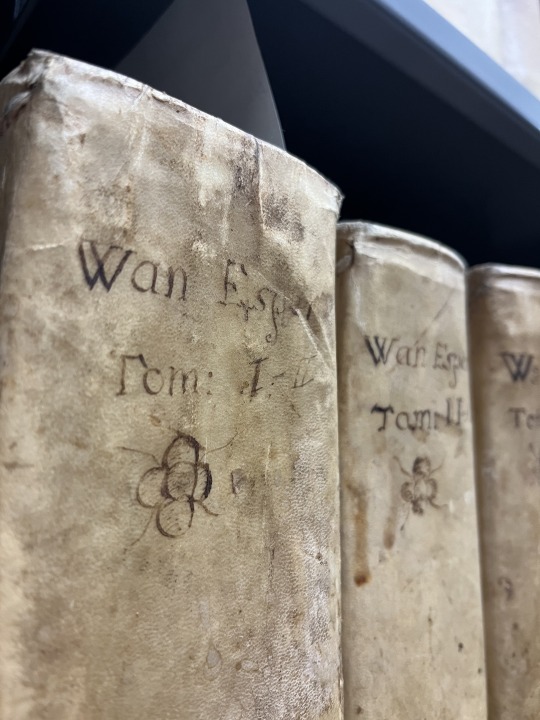
A peek at our aisle of Roman and Canon law books. Lots of hand-drawn flowers and swirly designs adorn these spines. I'm not sure why flowers were often the go-to, but I'd love to know.
#riesenfeld center#umn#university of minnesota law#university of minnesota law library#rare books#umn law#archives#special collections#law school#old books#flowers#drawings#vellum#shelfie
28 notes
·
View notes
Text
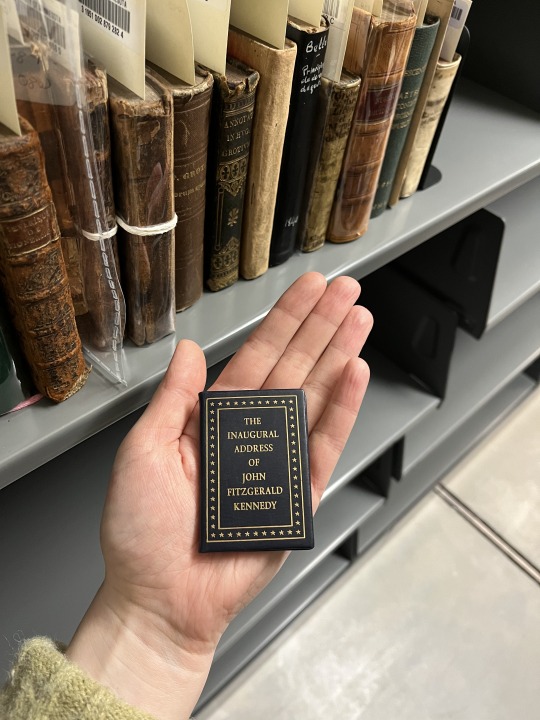
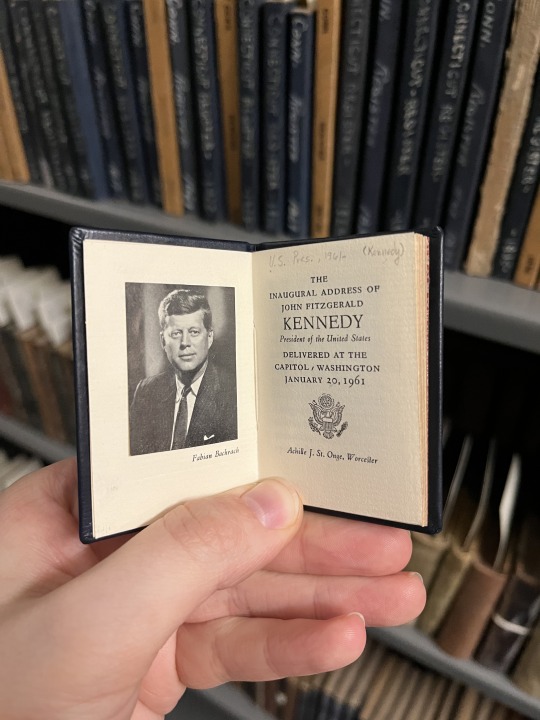

The tiniest book in our collection! This miniature printing of The Inaugural Address of John F. Kennedy is 2"x 2 3/4" and quite literally fits in the palm of your hand.
#riesenfeld center#umn#university of minnesota law#university of minnesota law library#rare books#umn law#archives#special collections#law school#jfk#us presidents#miniature books
131 notes
·
View notes
Text
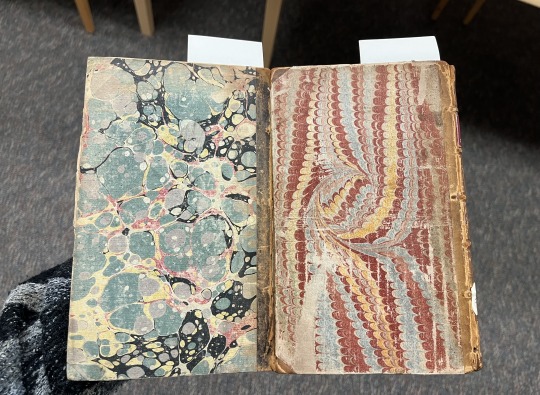
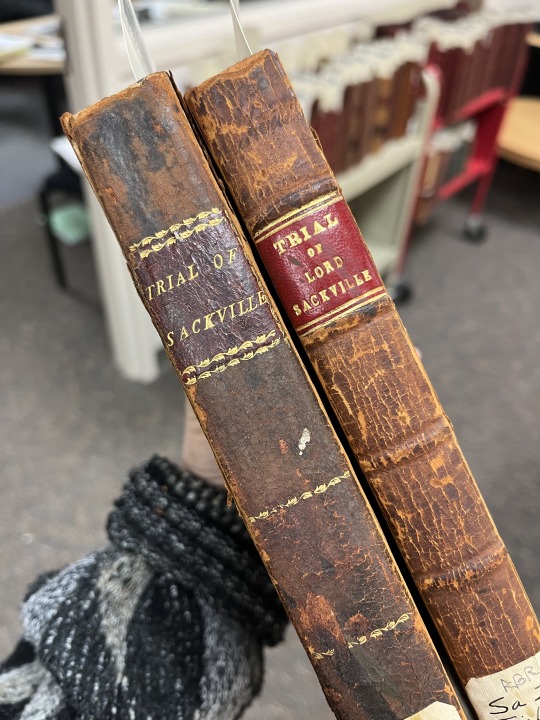
Some unexpected marbling on two books (here and here) covering the trial of Lord Sackville, 1760.
#riesenfeld center#umn#university of minnesota law#university of minnesota law library#umn law#rare books#archives#special collections#law school#old books#marbling#beautiful book covers
188 notes
·
View notes
Text
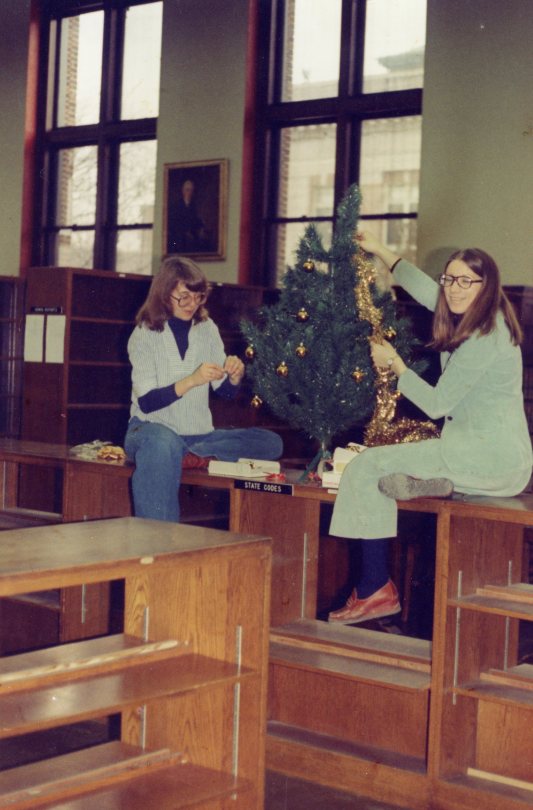
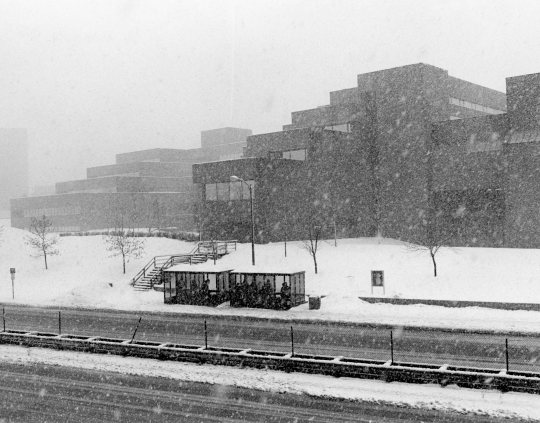
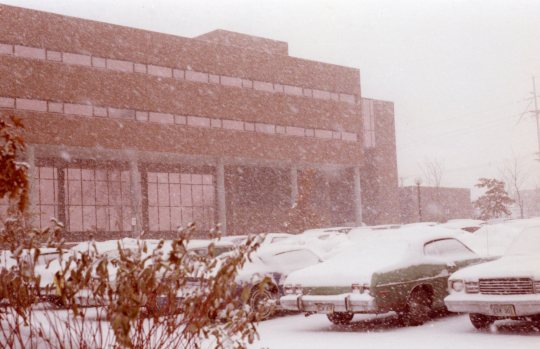
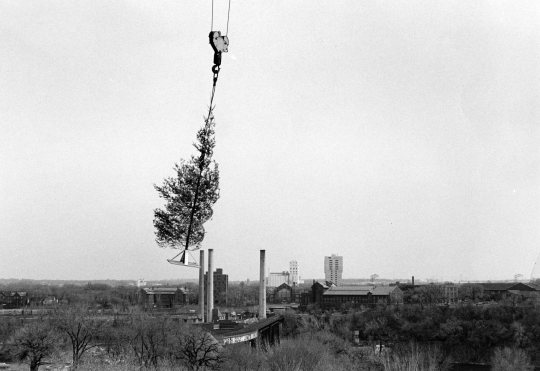
Dreaming of snow today in this unseasonably warm Minnesota winter. ❄️ As we quickly approach winter break here at UMN law, it's a perfect time to look through some photos of snow and trees in the archives!
Top to bottom:
1977: The law library's office assistant and a student employee decorate a small tree in the empty reading room in Fraser Hall.
1986: Students wait for the bus near Mondale Hall during a March snowfall.
1981: Snow covered cars in the Mondale parking lot.
1977: Topping off the new law school building with an evergreen tree.
#riesenfeld center#umn#university of minnesota law#university of minnesota law library#umn law#archives#special collections#law school#old photos#vintage photography#snow#winter#minneapolis#minnesota#christmas#holidays#winter break#library
60 notes
·
View notes
Text
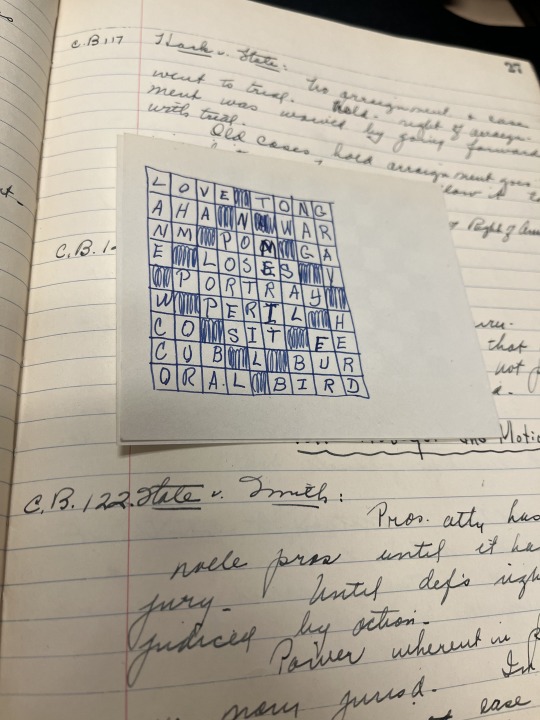


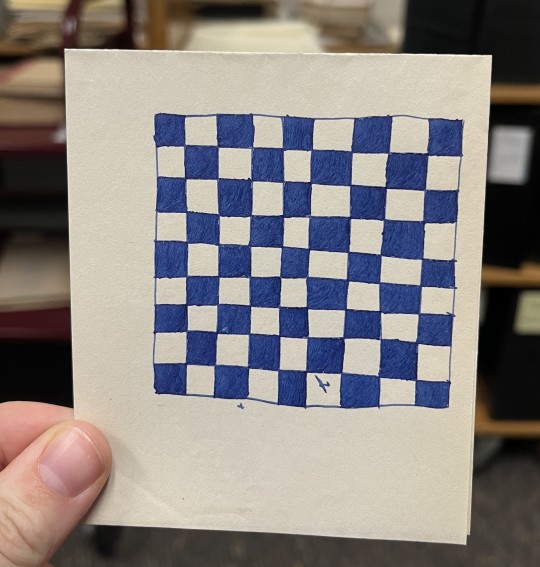
Move over, Will Shortz! Helen Spink Henton, a student at the law school in the 1920s, left all sorts of things tucked inside the pages of her notebooks. Evidently, she was a big fan of crosswords, or maybe she just enjoyed doodling during long lectures.
These notes come from one of Helen's notebooks from the 1924-1925 academic year, and are part of our larger collection of student notebooks.
#riesenfeld center#umn#university of minnesota law#university of minnesota law library#umn law#archives#special collections#law school#old books#notebook#crossword#crossword puzzle#nyt games#word games
24 notes
·
View notes
Text
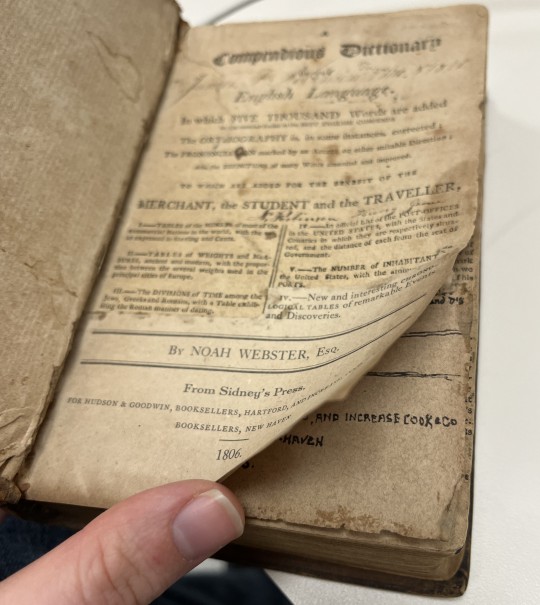
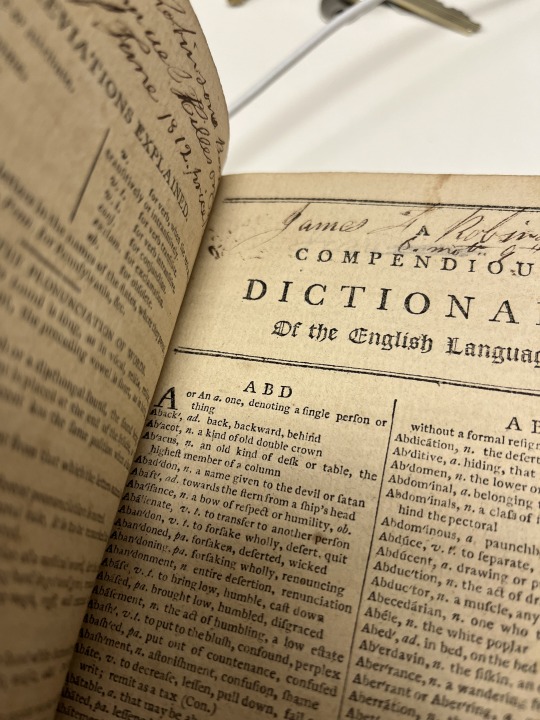
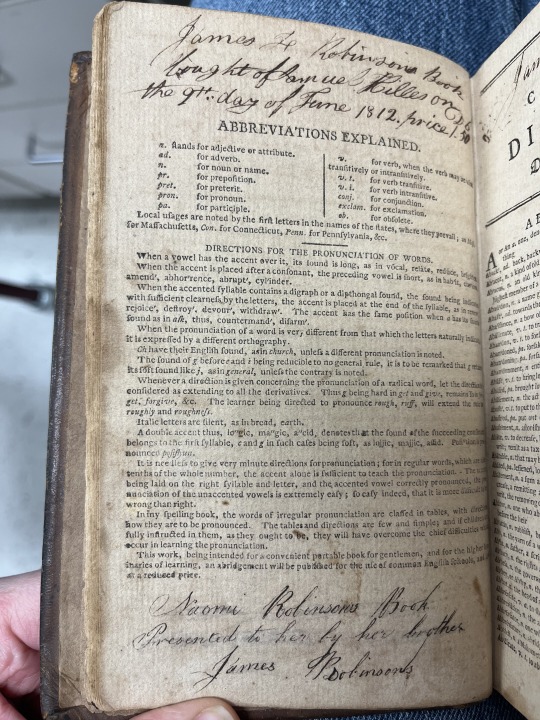
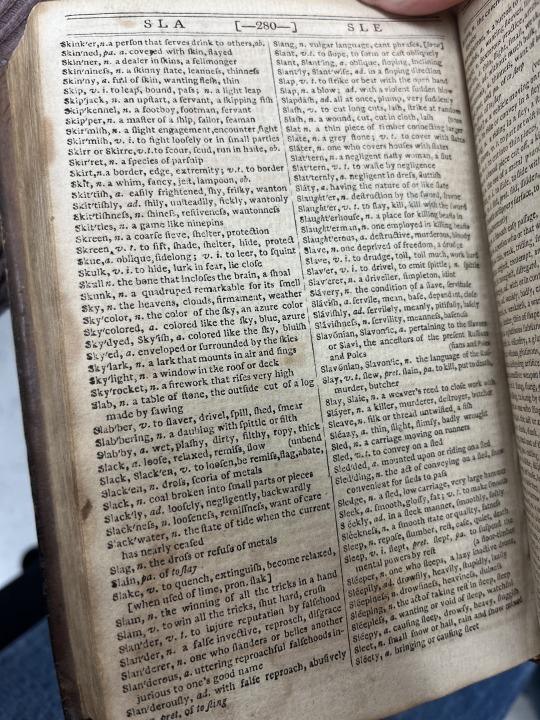


Noah Webster's first dictionary (and the first American dictionary!), A Compendious Dictionary of the English Language, published in 1806.
"No person acquainted with the difficulties attending such a compilation, will flatter himself or the public, that any thing like perfection is within the compass of one man's abilities. Nothing like this is here promised. All that I have attempted, and all that I can believe to be executed, is a dictionary with considerable improvements; a work required by the advanced and advancing state of science and arts. The dictionaries of a living language must be revised every half century, or must necessarily be erroneous and imperfect."
Not only does Webster go from A to Z, but he includes a chronological table of events events going from Adam and Eve to 1806. If you look closely enough, you can find out when and where Henry II first wore silk stockings.
#riesenfeld center#umn#university of minnesota law#university of minnesota law library#rare books#umn law#archives#special collections#dictionary#history#english#a to z#old books
58 notes
·
View notes
Text
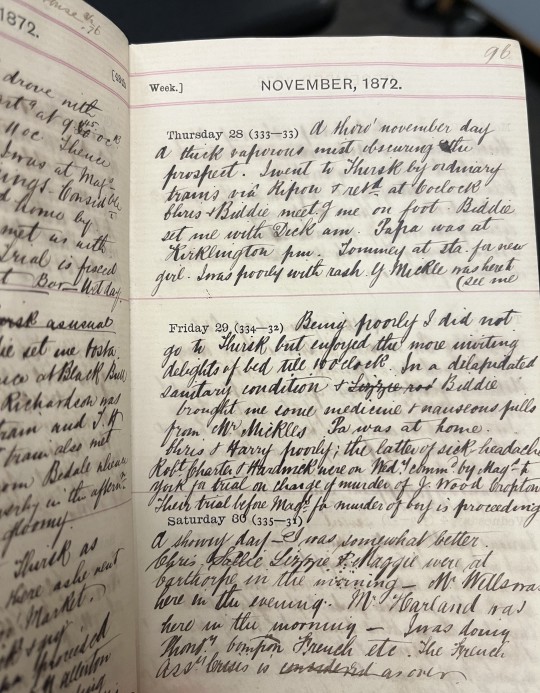
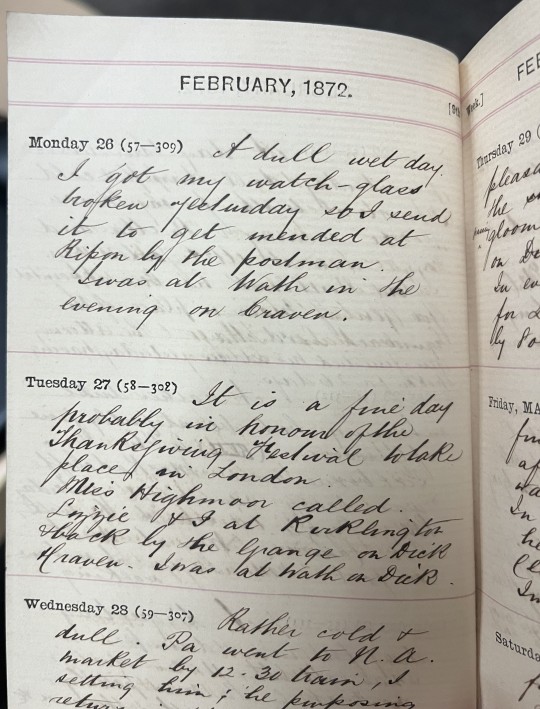
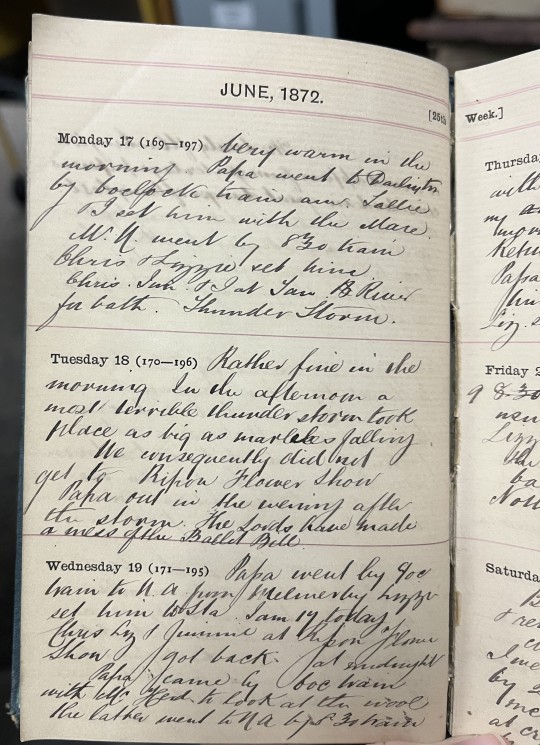

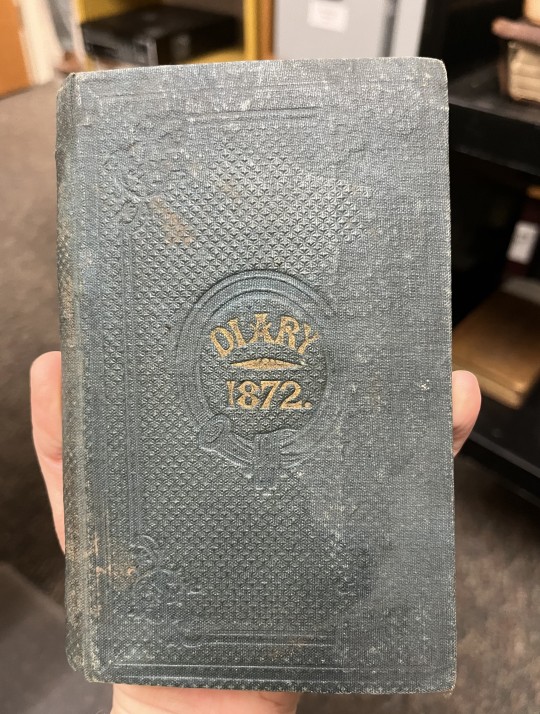
On this day 151 years ago, 17-year-old George Tutin, an English law student, was feeling sick and stayed in bed until 10am.
We've been thoroughly enjoying paging through this newly acquired 1872 diary, which is completely filled out and contains a lot of observations about the weather. More interestingly, it also notes what he was up to academically and personally. Tutin took a lot of walks, spent most afternoons studying, translated and read Virgil, kept up with international affairs, trimmed sheep, and unfortunately seems to have gotten a lot of colds.
November 29, 1872
Being poorly I did not go to Thirsk but enjoyed the more inviting delights of bed till 10 o'clock.
February 26, 1872
A dull wet day, I got my watch-glass broken yesterday so I send it to get mended at Ripon by the postman.
June 18, 1872
Rather fine in the morning. In the afternoon a most terrible thunder storm took place as big as marble falling. We consequently did not get to Ripon Flower Show. Papa out in the evening after the storm. The Lords have made a mess of the Ballot Bill.
#riesenfeld center#umn#university of minnesota law#university of minnesota law library#rare books#umn law#archives#special collections#law school#19th century#1800s#journal#diary#england#law#handwriting#penmanship#sleep
175 notes
·
View notes
Text
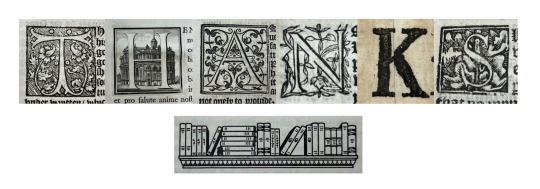
Happy Thanksgiving! Since everyone loved the initials from our recent post so much, here's an assortment (mostly) from our great collection of English law.
We're grateful for...kings? Unfortunately we couldn't find a decorated "K," but this image from a King's proclamation will have to do.
#riesenfeld center#umn#university of minnesota law#university of minnesota law library#rare books#umn law#archives#special collections#law school#thanksgiving#thanks#thankful#initials
40 notes
·
View notes
Text

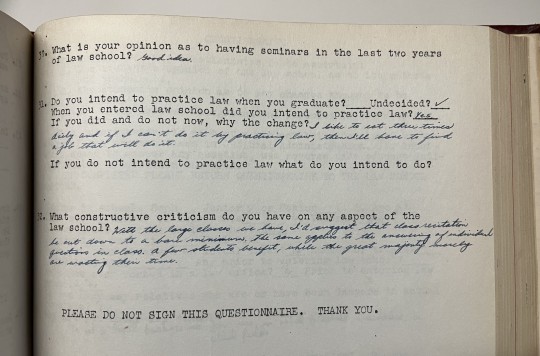
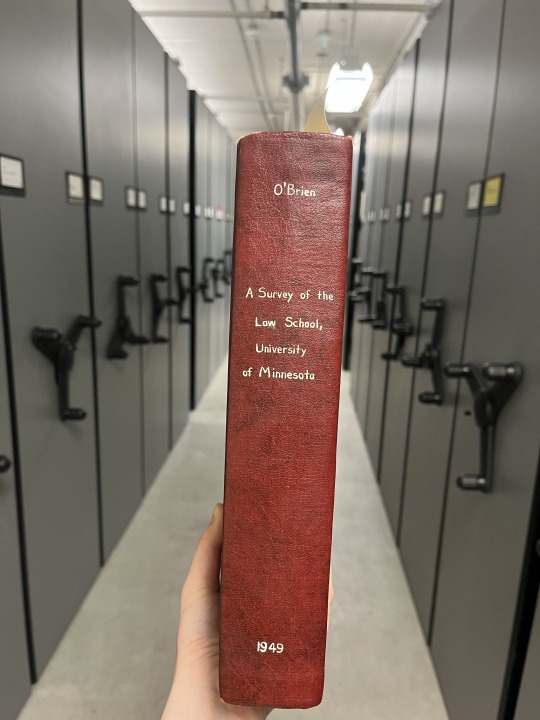
In a 1949 student survey, these two law students weren't shy about sharing their goals of putting dinner on the table. One answer might be a bit snarkier than the other though.
If you do not intend to practice law what do you intend to do?
STARVE
When you entered law school did you intend to practice law? If you did and do not now, why the change?
I like to eat three times daily and if I can't do it by practicing law, then I'll have to find a job that will do it.
#riesenfeld center#umn#university of minnesota law#university of minnesota law library#umn law#archives#special collections#law#survey#law school#law students
107 notes
·
View notes